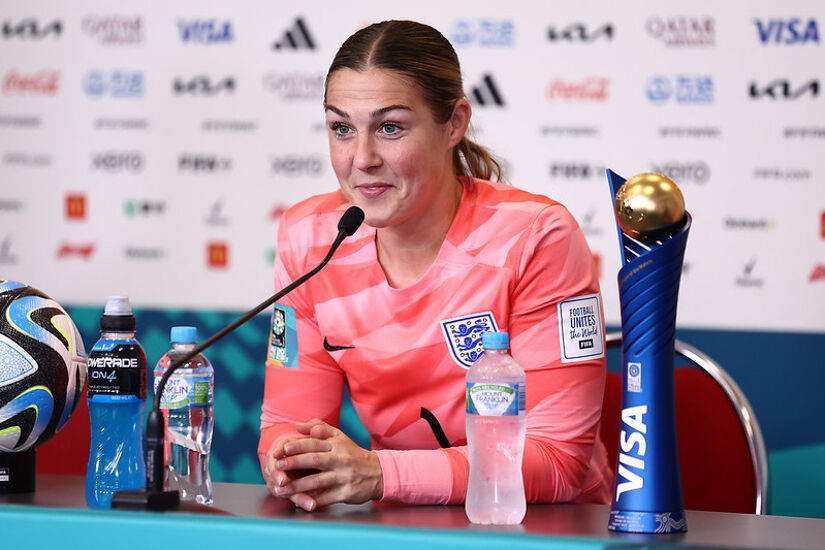The draw of the vulnerable athlete - Mary Earps and Ronnie O'Sullivan

Mary Earps Credit: Chris Hyde/FIFA/Getty Images
“I think Houdini said, ‘if you want to get a large audience anywhere, just say "in a certain time and a certain place, someone may die"…’ I think that’s what happens with Ronnie… you just feel that the drama is so intense that there’s a sense of death involved… you feel his health, his well-being…[that] he’s on the brink if he misses a shot.” - Damien Hirst, The Edge of Everything
It was evident something was off.
Mary Earps, serving as interim Captain for England's UEFA Nations League November clash, avoids meeting the interviewer's eye, her gaze fixed on something off-camera.
Hands on hips, it’s clear that Earps is struggling to keep her composure.
“I’m just sorry that my performance has cost the team tonight,” FIFA's 2023 World Cup Golden Glove winner remarks, making brief eye contact with the reporter before dropping her head.
When asked to dissect the Netherlands' second goal, where the Manchester United shot-stopper's uncharacteristically meek parry of Beerensteyn's strike leads to a goal group differential that sees the Euro 2022 Champions' dream of The Olympics cut short, Earps grimaces.
“Ooh. Words I definitely can’t say on TV,” she responds frankly, smacking her lips. “Yeah - that’ll definitely haunt me for a long time…I’ve really let the team down today. And I’m gutted. I’m really, really gutted.”
The ITV interviewer, perhaps feeling responsible for her part in eliciting such despondence, urges England's player of the year to consider her 35th-minute miscalculation in the broader context of a highly decorated career.
Her attempts are in vain.
“Yeah, I’m a competitor, but when it’s not good enough, it’s not good enough… “ Earps counters, spurning the salve of past glories. “You know, I can only apologize to my teammates and the fans, really. I take that with my full chest.”
The interview concludes, the camera panning back to the ITV studio, where former Gunner and England striker Ian Wright, is the first to puncture the heavy atmosphere.
“I don’t think she should be beating herself up like she is - she looks really quite distressed there,” he observes, concern etched on his face. “The fact is that we’ve seen on many occasions [how] Mary Earps has [actually] saved this team.”
Bare FACTs as the kids say.
In the hours that follow, the candid interview goes viral, Lioness fans expressing concern for their keeper's mental health across social media, while images of an inconsolable Mary Earps circulate on news feeds, inflaming their fears further.
Broadcast on repeat, footage shows a furious Earps hammering the Wembley soil with a gloved fist in the aftermath of her unforced error. As the hours tick by, it becomes clear that ‘Mary’ from Nottingham, the fallible human being, is far more relatable to the masses than ‘Mary Queen of Stops’, the Lioness pioneer.
Curiosity piqued, I begin to Google, learning that her journey from third-choice ‘reject’ to the heroine between the posts has not been without its peaks and troughs.
Speaking in the BBC documentary - Lionesses: Champions of Europe - she admitted: "To be honest, I never thought I would get back to this point (as England's number one goalkeeper). I didn't think I would be in a squad for a major tournament again, let alone playing a final against Germany at Wembley.”
"I can vividly remember the days of feeling really down,” she continued, “I got to a point where I felt I had sort of reached my limits. I had given football a good go but wasn't quite good enough. I had responsibilities, I had a mortgage, and it wasn't adding up. Eventually, I decided to give it just a couple more years.”
Shortly thereafter, in 2021, Sarina Wiegman would summon her from international purgatory.
History beckoned.
"I felt that she really understood where I came from and had real empathy for me as a human being,” she reflects, speaking of her first impressions of Wiegman. “That is not something I've experienced a lot in football.”
Named ‘Best Goalkeeper’ at the FIFA awards in February of this year, following several standout performances in the 2022 Euros which helped her nation pocket their first significant silverware since 1966, she gave a speech that once again, connected with viewers on a visceral level.
“This is for anyone who has ever been in a dark place,” she voiced, clutching her prize with an uncharacteristically unsteady hand. “Sometimes success looks like this, collecting trophies; sometimes it's just waking up and putting one step in front of the other…just know that there’s light at the end of the tunnel. There’s only one of you, and that’s more than good enough. Be unapologetically yourself.”
Earps, a pioneer in the women's game (she persuaded Nike to reconsider their ill-judged decision not to sell her goalkeeper jersey in time for the Women's World Cup - a tournament she excelled in), has gone from strength to strength, burying the ghost of her schoolboy Nations League error with another gravity-defying performance in England's 6-0 victory over Scotland.
In fact, having just been nominated for the prestigious BBC Personality of the Year Award, her popularity is now greater than ever.
So what is it about the vulnerable sportsperson that draws us in so? In the world of the smartphone, where everyone, from child to adult, plays to the camera - is authenticity, an increasingly scarce commodity, the real allure?
Take Ronnie O'Sullivan.
Described by snooker and non-snooker fans alike as ‘gifted’, ‘a genius’, and ‘the best to ever do it’, ‘The Rocket’ is known in equal measure for his battles on, and off, the baize.
Turning professional in the 90s, O'Sullivan, much like his predecessor Alex ‘Hurricane’ Higgins, arrived on a pro snooker circuit characterised by a methodical and even-tempered potting machine.
Yet despite the Essex Exocet's unpredictable form and borderline disregard for the game (he once conceded a best of 17 match with only five frames played), O'Sullivan has garnered a loyalty and love from the public that his seven-time ‘Worlds’ winning rival, Stephen Hendry, could only dream about.
Paradoxically, O'Sullivan's unrelenting self-doubt, yearly threats to retire, never-ending criticism of the World Snooker body, and raw unfiltered interviews were (and continue to be) a breath of fresh air that resonate with the viewing public.
An example of his ever-present and endearing vulnerability can be glimpsed in his Amazon Prime documentary, which was released on the 23rd of November.
Entitled The Edge Of Everything, it provides a rare insight into the pressure the world-class sportsperson must not only perform under but thrive in spite of.
Backstage at the Worlds final in 2022, we see Ronnie teetering on the precipice of a breakdown as his lead dwindles dangerously against ‘The Ace in the Pack’, Judd Trump.
Under the blazing lights of the lone table in The Crucible, Sheffield, O'Sullivan is the first to break.
“This is like fucking horrendous for me. I froze today, mate. I fucking froze today, and that’s why I don’t wanna do it, mate, cause I knew I was gonna freeze… it’s killed me…. I don’t want it, mate…” He entreats to his iPhone from the safety of his hotel room, “ …emotionally it’s just got me involved again and I fucking hate this shit, mate. I fucking hate it…I just wanna get this over and fucking done with and have a beer with you guys tonight and just fucking give you a hug, mate…I feel fucking battered.”
Widely reported, O'Sullivan’s personal struggles can be traced back to the incarceration of his father and mentor, Ronnie Snr, thirty-one years ago.
In the months and years that followed, O'Sullivan, already a professional snooker player, competing and beating experienced players twice his age at the tender age of 17, battled with both ‘snooker’ depression and severe anxiety, experimenting with drugs and alcohol in an attempt to fill the void his father left when imprisoned in Gartree.
“If I’d really let it all out, they’d have locked me up,” he recalls to the Amazon crew. “They’d have said, ‘he’s a danger to himself’…[there was] just self-doubt and self-sabotage…[such] hatred toward myself.”
The empathy invoked from the loss of his father at such a critical juncture, coupled with his bizarre media interviews and ambidextrous wizardry on the table, has throughout his career, led fans to remain loyal when his mood or interest in the game has dropped.
“I have battle scars…” he confides in his autobiography, Unbreakable. “I will have days when I’m up and the world feels like it’s mine to conquer… I forget my limitations… I feel like Braveheart. Then there are the down days…and from there the descent begins. I think ‘I’m done, I'm done with snooker. I'm forty-seven years old, not twenty-one. What if the magic is gone?’ [But] I still love the game…I will always love the game.”
Reflecting on both O'Sullivan and Earp's careers, I am all the more convinced that ‘Mary’ from Nottingham, in her FIFA Best World speech, nailed the reasoning behind our affiliation with, and adoration of, the vulnerable sportsperson.
Authenticity.
In a world where every action you take and every word you utter is examined microscopically, “being unapologetically yourself” requires bravery.
It's no wonder we resonate, connect with, and admire those strong enough to do just that.

